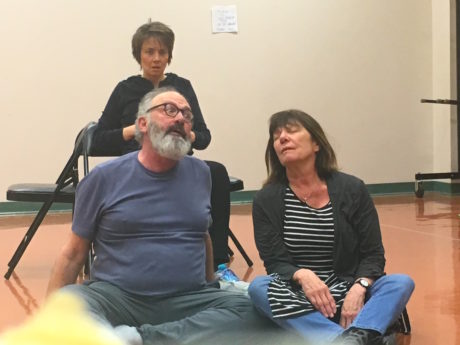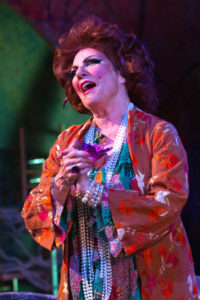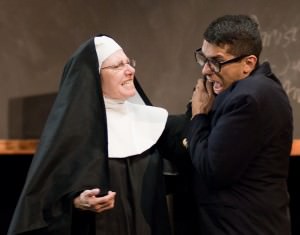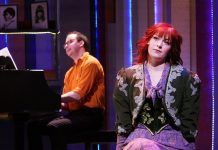Much of the publicity for the much-anticipated Avant Bard production of King Lear has focused on Rick Foucheux’s Lear. I recently saw Foucheux play Gloucester in a production at George Washington University. Now I am really looking forward to Foucheux’s Lear! But there is another exciting aspect to this production that hasn’t yet received the attention it deserves. I refer to Director Tom Prewitt’s casting the role of Gloucester with the noted actress Cam Magee, a member of the Avant Bard Acting Company who was spectacular in the title role of Avant Bard’s The Madwoman of Chaillot in 2015.
I interviewed Ms. Magee to get her take on this fascinating turn of events.

Sophia: Initially Gloucester brags about having an illegitimate son (Edmund). How does Gloucester being a mother change this?
Cam: I own a wonderful book called Clamorous Voices: Shakespeare’s Women Today. My favorite quote is from Harriet Walter:
In a sense the character doesn’t speak the text, the text “speaks” the character. Use the text as your only clue. You then play each scene or each beat, however contradictory or incompatible it seems with what has gone before or comes after. You play the moment for its integrity, for what is. Then by the end of the play, the character is an accumulation of all those separate moments.
It may startle the audience’s ear to hear a Gloucester as a woman say of her son, “ . . . yet was his father fair, there was good sport at his making, and the whoreson must be acknowledged.” But what I hear in the line is that Gloucester has no shame or at least admits no shame that she has a bastard son and she wants to introduce this son to the Earl of Kent.
I think when a woman plays a man’s role, there will be lines that the audience will hear differently. When a woman says the line “O ruined piece of nature” she could be speaking about herself as well as Lear.

How will the fact that you are a female affect the scene in which Gloucester is blinded?
When you are in the world of storytelling, you are also in the world of myth and stereotypes. It’s a myth that men don’t physically suffer as much as women. The blinding is not something that anyone could just suck up and walk off.
It’s a very cruel scene and Shakespeare calls it cruel. But think of what’s happening to women all over the world. How is the blinding of Gloucester as a woman any more cruel than acid being thrown in women’s faces or what has happened to the Nigeria Chibok girls?

How do you prepare differently as an actress for a regendered role?
I don’t think I prepared any differently than I have in the past playing Shakespeare. Ultimately any back story I make up for Gloucester comes down to what is playable on stage. I took Harriet Walter’s advice to heart and looked at the text. What I’ve found in the text is that Lear’s actions have turned Gloucester’s world on its head. So anything becomes possible. It’s possible that her son Edmund is willing to murder her for her money. It is possible her son Edmund is telling her the truth. I found that Gloucester doesn’t use the word “love” when she speaks about her sons until after she feels betrayed by Edmund. I found that Gloucester doesn’t refer to “the gods” until she’s blinded and then she refers to them constantly. I found out a lot about Gloucester from the words.
What time is the production set in?
Fairy tale time. Allegory time. Now, but not now. Contemporary, but no phones—we have letters. When I first read King Lear I thought the play was so bleak. The characters call on the gods constantly and the gods don’t answer…. But there are small moments of human kindness and human understanding that changed my mind about the play being bleak. I find it full of kindness now.

How do you plan to approach the suicide scene?
Ultimately Gloucester wants to be reunited with Edgar, but since her actions have made that reunion unlikely, she wants to die; and she wants to die near the King. There are several scenes where Gloucester is very willing to die, but only one scene where Gloucester actively tries to end her life herself. So my question becomes, How does the suicide scene change Gloucester? Not until she’s told that she miraculously survived throwing herself off the white cliffs of Dover do the gods become real to her. Once the gods become real to her, she asks the gods to end her life. So any opportunity to die may be a gift from the gods.
What was it like to work with Rick Foucheux?
Rick and I did our first play together 35 years ago, R.U.R. at Woolly Mammoth. We did lots of plays together when we were young. We have so much shared history and so much trust between us that most of our work has been intuitive. Cam/Gloucester and Rick/Lear sit down and speak the truth to each other. Working with Rick has been and is one of the joys of life.
King Lear plays May 25 to June 25, 2017, at Avant Bard performing at Gunston Arts Center, Theatre Two – 2700 South Lang Street, in Arlington, VA. For tickets, call the box office at (703) 418-4808, or purchase them online.
VIDEO:





